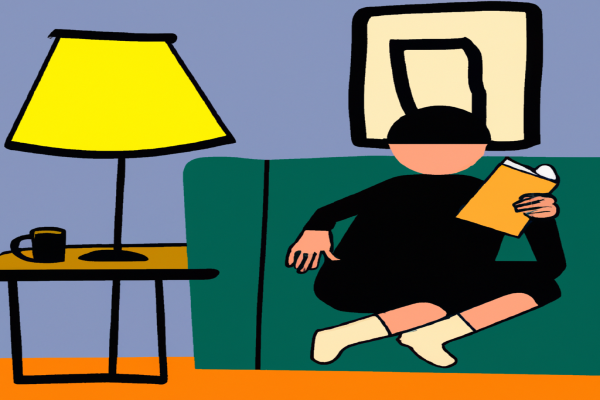Fahrenheit 451: Summary

Fahrenheit 451 is a science fiction novel by Ray Bradbury about a dystopian future where books are outlawed and firemen are employed to burn them. The protagonist, Guy Montag, is a fireman who begins to question the suppression of knowledge. He meets a young woman named Clarisse, who helps him to begin questioning his values and encourages him to read books. Eventually, Guy joins an underground society of rebels who have memorized books in order to save literature from destruction. In the end, he takes a stand against the oppressive government and burns down his own house full of books.
Want to know more?
What is Fahrenheit 451 about?
Fahrenheit 451 is a dystopian novel by Ray Bradbury, published in 1953. The title refers to the temperature at which paper ignites. It is set in an unspecified future city where books and independent thinking are outlawed. The novel follows protagonist Guy Montag, a fireman whose job is to burn books rather than save them. Through Montag’s journey of self-discovery, the story explores themes of censorship, individualism, conformity, and freedom of thought. Censorship is a key theme in Fahrenheit 451. In this world, books are banned and burned because they are seen as threatening to the state’s ideological control over its citizens. The government uses propaganda, fear tactics, and distraction to keep people from questioning authority or seeking knowledge outside the prescribed curriculum. Individualism is another major theme in the book. Montag begins as a conformist but gradually learns to think and act for himself as he discovers that “there must be something in books, things we can’t imagine, to make a [person] stay in a burning house; there must be something there.” He eventually comes to understand that freedom and happiness come from discovering one’s individual identity and using it to think critically and make personal choices. Conformity is also explored throughout the book; Montag’s wife Mildred chooses to conform even though she knows it will bring her unhappiness. He also meets Clarisse, a free-thinking teen who encourages him to question the status quo and explore his own thoughts and ideas. Finally, freedom of thought is a major theme in Fahrenheit 451. Montag eventually breaks away from conformist society and learns that true freedom lies not in following orders but in thinking and acting independently. He discovers that knowledge can bring liberation from oppression and finds joy in discovering his own individual identity through reading books that were once forbidden.
Fahrenheit 451: Book Club Questions
- What themes does the novel explore and how do these themes relate to our lives today?
- How does technology play a role in the novel, and what might be the implications of this for society?
- What do you think about the idea of censorship, as portrayed in the book?
- How does the power of books influence people’s lives and opinions?
- How did Montag’s transformation serve as a commentary on conformity and individuality?
- Why do you think the firemen in the novel burn books instead of preserving them?
- What messages can be drawn from comparing characters such as Montag and Clarisse, or Beatty and Faber?
- How does Bradbury use symbolism throughout the novel to illustrate his themes?
- How does the ending of Fahrenheit 451 provide closure to its story?
- How do you think this novel will influence future generations, if at all?
What to say about Fahrenheit 451
- Fahrenheit 451 is a dystopian classic that provides readers with an interesting and cautionary exploration of the power of censorship.
- The novel offers a unique perspective on how technology can be used to both liberate and control society.
- The character development in Fahrenheit 451 is strong, allowing readers to connect emotionally with each individual's journey.
- Ray Bradbury's vivid imagery transports readers into the world of Fahrenheit 451, making it a truly immersive experience.
- The setting of the novel serves as a powerful metaphor for the dangers of conforming to societal norms without question.
- Through its clever use of symbolism, Fahrenheit 451 conveys complex themes such as freedom and oppression in an accessible manner.
- While the story portrays a bleak future, it also offers hope by suggesting that individuals have the power to create change through their own actions.
- Fahrenheit 451 raises important questions about the effects of censorship on society and its potential consequences for our future.
- It is remarkable how relevant this book remains even after more than six decades since its original publication in 1953.
- In Fahrenheit 451, Ray Bradbury shows us how books are essential sources of knowledge and imagination, which should never be taken for granted.
Top 5 Quotes from Fahrenheit 451
- "It was a pleasure to burn."
- "We must all be alike. Not everyone born free and equal, as the Constitution says, but everyone made equal."
- "There must be something in books, things we can't imagine, to make a woman stay in a burning house; there must be something there."
- "If you don't want a man unhappy politically, don't give him two sides to a question to worry him; give him one. Better yet, give him none."
- "The books are to remind us what asses and fools we are."
Adaptations of Fahrenheit 451
1. Fahrenheit 451 (2018): This feature film adaptation of Ray Bradbury's classic novel was released in 2018 and stars Michael B. Jordan and Michael Shannon. 2. Fahrenheit 451 (1966): This feature film adaptation of the novel was released in 1966 and starred Oskar Werner and Julie Christie. 3. Radio Adaptation (2005): An hour-long radio adaptation of the novel was produced by BBC Radio 4 in 2005, starring Alan Rickman as Montag and Tim Pigott-Smith as Captain Beatty. 4. Fahrenheit 451 (1982): This made-for-TV movie adaptation of the novel was released in 1982 and starred Leonard Nimoy and Brad Davis. 5. Fahrenheit 451 (2012): A stage adaptation of the novel was written by playwright Andrew Bovell and premiered at the Sydney Theatre Company in 2012. 6. Fahrenheit 451 Podcast Series: In 2019, Audible released a podcast series adaptation of the novel narrated by Michael B Jordan, who also starred in the 2018 feature film adaptation.
Other books by Ray Bradbury
- The Martian Chronicles
- The Illustrated Man
- Dandelion Wine
- Something Wicked This Way Comes
- Death Is a Lonely Business
- The Halloween Tree
- A Medicine for Melancholy and Other Stories
- I Sing the Body Electric!
- The Golden Apples of the Sun
- Farewell Summer
- The Small Assassin
- The Fog Horn and Other Stories
- Long After Midnight
- Green Shadows, White Whale
- The Veldt
- Quicker Than the Eye
- Let's All Kill Constance
- Driving Blind
- Ahmed and the Oblivion Machines
- From the Dust Returned
- One More for the Road
- Zen in the Art of Writing
- We'll Always Have Paris
Did you know?
Fahrenheit 451 was the temperature at which paper spontaneously combusts.




